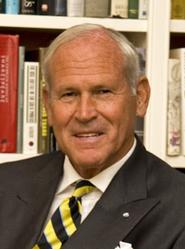
Retired Lieutenant General Josiah Bunting III’s lecture on leadership during WWII offered an appropriate observance of Veterans’ Day. Bunting has published four books, most notably The Lionheads (1972), which was selected as one the “Ten Best Novels” of 1973 by Time Magazine, and more recently An Education for Our Time (1998) and a biography of Ulysses S Grant (2004). He follows Alexander Hamilton’s legacy of being both a decorated military commander and distinguished academic.
Bunting served as an infantry officer in Vietnam with the Ninth Infantry Division. During his military career, he earned the Bronze Star with two Oak Leaf Clusters, Army Commendation Medal, Vietnam Honor Medal—2nd class, Presidential Unit Citation, Parachute Badge, Combat Infantry Badge and Ranger Tab. After retiring from the service, he taught history at West Point and the Naval War College; he was also president of Briarcliff College and then Hampden-Sydney College, before serving as superintendent of the Virginia Military Institute, his alma mater, until 2003.
Beginning his discussion with a description of the mindset of World War II veterans, Bunting noted how these men slipped – almost unnoticed – into the community of heartland America following the cessation of the conflict. They simply did not talk about the war. If pressed, the most any soldier would admit to was, “yeah, I was in the service,” according to Bunting.
Bunting points to, “a quality of character that is almost nonexistent today—modesty.” He further noted that modesty is the ability to do what is necessary without need for recompense, and to keep your conscience as your guiding force. As the leaders of World War II came together to meet the terrific threat of the Axis powers, Bunting said, “Political ideologies took a backseat to getting the necessary done.”
To understand why the men exhibited this quality of character, he introduced the idea of, “prosopography,” the study of history and institutions through groups of individuals. As Bunting described, the World War II leaders were primarily raised on farms in the late 19th century. These men necessarily learned from a young age to be self-reliant, determined and, above all, modest. Furthermore, military service academies offered an unprecedented opportunity – free education.
They were uniquely prepared for World War II including leaders like Generals MacArthur, Bradley and Marshall, who devoted their lives to military service. “They had hung in there. They had spent their lives preparing for what was to come,” he said.
He also lauded the leadership of President Roosevelt, especially his fireside chats, which explained the movements of the military to the general public. Bunting said Roosevelt recognized, “an obligation of leadership to tell the country continuously what we are doing with our military people.” He pointed out that otherwise, the public becomes estranged from the realities of the military; the casualties of war seem pointless to an unaware public.
The leaders of World War II continued to lead effectively following the end of the conflict. They committed the nation to rebuilding war-torn Germany and Japan—countries they were focused on destroying only months before. Bunting believes that, “our country should be about the business of lending a helping hand.” The American leadership held this same notion, and, acting with the same consensus that they enjoyed in wartime, set about reconstruction.
He concluded his talk by stressing that knowledge and, more importantly, implementation of history’s lessons, can create successful leadership in the modern day. In World War II, America faced down an immense threat via modest, unified leadership. Bunting believes that America must set aside pride and partisanship if it is to remain influential in the future.
Bunting’s lecture was sponsored by AHI Undergraduate Fellows and was the first in a planned series of annual Veterans’ Day events.
